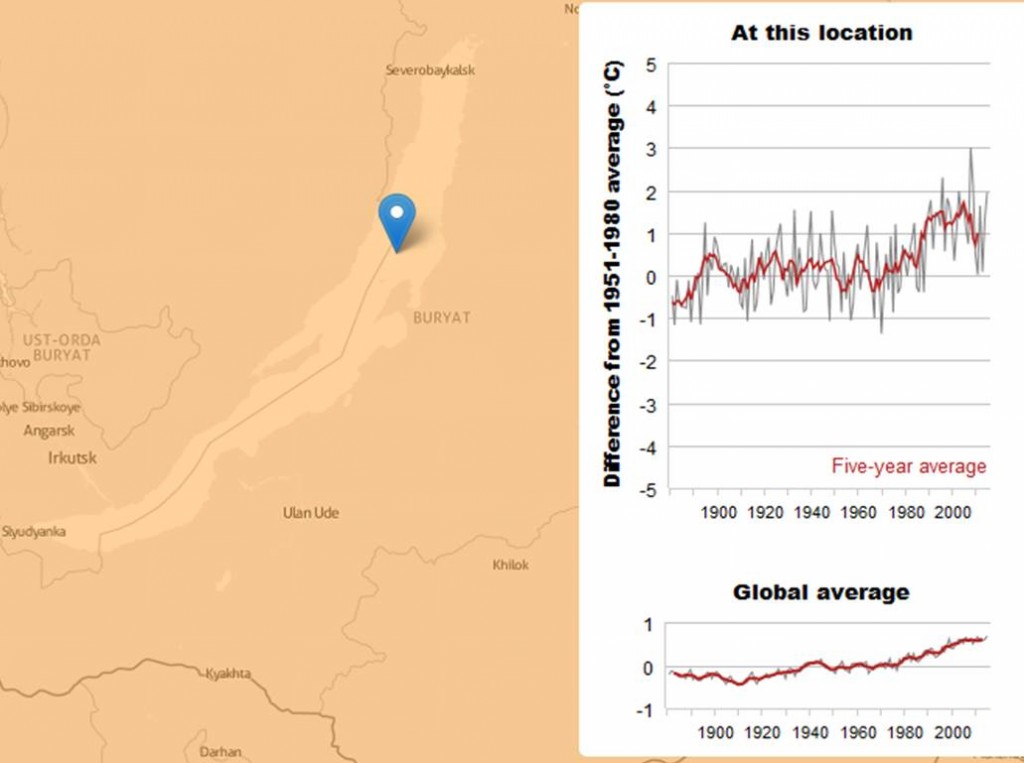Water shortages at Lake Baikal: climate activists ignore important climate cycles
By Dr. Sebastian Lüning and Prof. Fritz Vahrenholt
[Translated, edited by P. Gosselin]
Not long ago we corresponded with the Helmholtz Asscoiation over a somewhat botched article about Lake Baikal. They simply assumed that the climate at the lake had been constant before industrialization – a fatal flaw.
On May 6, 2015 the activist groups of 350.org and Global Voices followed and committed similar flaws when they misinterpreted the current climate changes as “unique” and as “something that had never occurred before“. At Global Voices we read [translated from the German]:
According to experts, climate change is the cause of Russia’s shrinking Lake Baikal.
[…] The Russian Minister had clear words for the drop in the water level: ‘The climate’. So what on earth has happened with the climate? Experts assume that precipitation amounts in the Baikal region fluctuate in cycles of several decades. What is now happening, however, is clearly out of the pattern of normal variation. At the end of March the water level for example fell 9 cm below the critical value. Such a water shortage has not been observed in over 100 years. According to the Ministry for Catastrophe Protection, the water amount finding its way into the lake in the summer and fall of 2014 was only 65% of the climatic normal. The drying of Lake Baikal is taking place within the backdrop of a dramatic climate change in Russia: According to the Rosgidromet Meteorological Center, the rise in the mean temperature occurred here 2.5 times faster than it has globally. Climate change is leading to a rapid rise in the frequency of natural catastrophes, including drought.”
It’s nice to see that activists are at least recognizing precipitation cycles on a decadal scale. However they fail to take the longer term hundred-year or millennial cycles into account. The lowest lake water level in the last 100 years? That is only a tenth of a 1000-year cycle that is clearly described in the literature. See: “Study by the University of Alberta: 1000-year climate cycles triggered by solar activity fluctuations“ or “Climate at Lake Baikal pulsed in sync with the sun over the past 5000 years“.
In January, 2015, Sputnik News discussed the reasons for the water shortage. In addition to a pronounced drought in the previous year, also the hydropower plant removed too much water from the lake:
Over the past twelve months the lake water has dropped a record 40 cm to a sixty-year low — just shy of the critical mark of 456m. Some experts blame this on the local energy companies, but officials and biologists attribute the drop to last year’s drought.”
No word on this at 350.org/Global Voices. Instead they prefer to dramatize the warming of the past 70 years:
Lake Baikal is indeed warming. According to a study published already in 2008, the temperature of the surface water of Lake Baikal has risen already 1.21°C since 1946.”
Why do the activists cite a study from 2008 when there is more up-to-date data available that extends to today? Why the seven-year omission? We want to know more about this and so we look at the Lake Baikal GISS temperature record for the past 130 years at New Scientist:

The answer: In 2007 there was an extreme warm peak that obviously some people wanted to fully use in the statistic. In truth the temperatures have been falling again at Lake Baikal since 2004, measured with the 5-year running mean. In principle temperatures at Lake Baikal already have stagnated since 1988. Moreover the activists failed to mention that 1000 years ago, during the Medieval Warm Period, Lake Baikal was once similarly warm as it is today, perhaps with similar warming spells during the transition phase.





Why do they just make stuff up?
Interesting studies do exist:
http://en.wikipedia.org/wiki/Baikal_Archaeology_Project